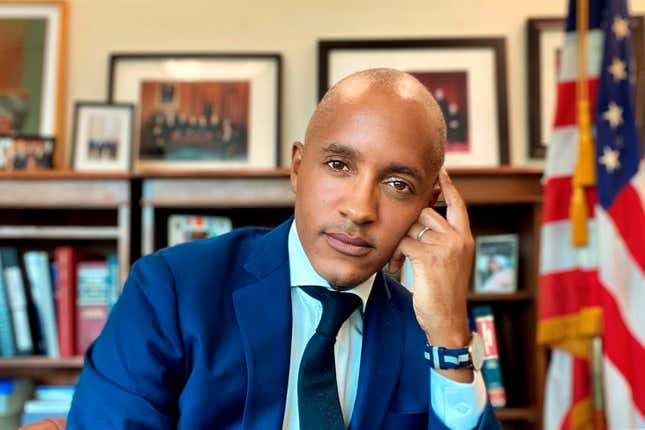
Damien Williams was confirmed by the U.S. Senate this week to be the next United States attorney for the Southern District of New York, the first Black person to lead the office in its 232-year history. The position makes him the most powerful federal law enforcement official in Manhattan at the age of 41 years old, according to the New York Times.
People who have held this position have gone on to be judges, senators, cabinet members and even New York City mayor, in the case of Rudy Giuliani. What is interesting about Giuliani is that the Southern District office is investigating the former mayor, a case Williams will be overseeing. He is also overseeing the case of Ghislaine Maxwell, a longtime friend to Jeffrey Epstein, who is being tried on sex-trafficking charges. The office has also taken on cases that have reached Donald Trump’s inner circle.
Williams, who clerked for current U.S. Attorney General Merrick Garland when he was a federal appellate judge and Supreme Court Justice John Paul Stevens, has his plate full, starting with the lack of diversity in the office. Of its 232 assistant U.S. attorneys and executives, just seven—including himself—are Black, notes the Times.
The Southern District is known for its independence from Washington, D.C., so much so that it has earned the nickname “the Sovereign District.” But the office was under siege by the Trump administration. Two of the last four top Southern District prosecutors were fired by the Trump administration. The most recent one was Geoffrey S. Berman after former Attorney General William P. Barr tried to replace him with a political ally, which was unsuccessful. The Times reported that Barr and other Justice Department officials tried to interfere with some of the Southern District’s top cases and investigations.
Here is a little background on Williams’ time at Yale Law School, per the Times:
Harold Hongju Koh, then the law school’s dean, recalled conversations with Mr. Williams about how the criminal justice played out at two levels: in the individual case and the system more broadly.
“The question is how do you do both — get justice in an individual case, and not ending up becoming an instrument of an unjust system?” Professor Koh said. “He was very attuned to that challenge.”
Mr. Williams also took a keen interest in voting and civil rights, said Heather Gerken, a professor who is now Yale Law School’s dean. She said he turned in one paper on the 15th Amendment, which bars discrimination in voting on account of race, that was so insightful it caused her to revise her class notes and rethink how she taught the topic.
“He was one of those students who doesn’t speak a lot in class,” she said, “but every single person listened to every word he said.”
He also published a meticulously researched and reasoned paper in the influential Yale Law Journal. It examined the devastating impact of Hurricane Katrina in displacing Black voters in New Orleans, and it offered an ingenious proposal for how the Justice Department could use a provision of the Voting Rights Act of 1965 to protect them from disenfranchisement.
The law journal, in fact, also posed a different kind of challenge for Mr. Williams, drawing on his skills as a mediator and emerging leader. After an earlier set of journal editors invited a speaker to appear at a campus symposium in March 2006, a bitter debate erupted when it was discovered that the speaker once had made racist references in an online posting.
Amid bad feelings about the episode and broader questions about the journal’s dedication to having a range of voices in its writings and among its staff, a new editor in chief, Jessica Bulman-Pozen, named Mr. Williams to a specially created ombudsman position.
“It was just universally understood that Damian would be a person who had the judgment and respect to help set a new path,” she said.
“The real question isn’t how we avoid a situation like this but rather how we adapt going forward,” Mr. Williams told The Yale Daily News then. “The process sometimes matters as much as the outcome.”
Williams joined the Southern District office in February 2012, after some time in private practice to become a prosecutor. From there, he trajectory advanced very quickly to his current position.
“It’s not just that Damian is going to be a Black U.S. attorney,” said Martin S. Bell, a former Southern District prosecutor who is also Black. “He’s also somebody who offers a heightened potential for thoughtfulness and creativity when it comes to bigger questions concerning criminal justice — and the office’s own ability to be credible to a rich, vast and diverse constituency of New Yorkers.”

